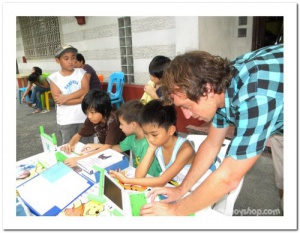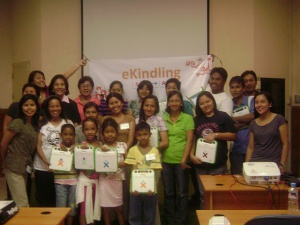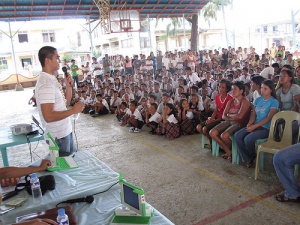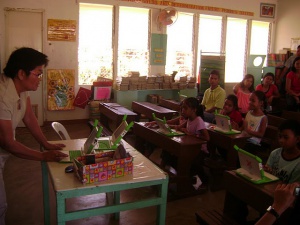OLPC Philippines
| 2007 status: green | ||||
| green | ||||
Mabuhay! Welcome to OLPC Philippines
OLPC Philippines (OLPC PH) is a grassroots coalition of forward-looking and like-minded individuals living in the Philippines and abroad who are working to bring the ideals of OLPC to Filipino children. Please join and share your ideas - we're still very much in the formative stages, so people who are eager and willing to jump in are very, very welcome.
To join the group's distribution list, subscribe to the olpc-philippines mailing listand participate in the discussions.
To keep abreast of the latest developments on the OLPC program in the Philippines, please check regularly this Wiki page for the latest developments.
Contact for a Philippine Deployment
- OLPC Foundation Incorporated (OLPC-FI). Please see below.
- Website: http://www.ekindling.org
- Email: community@ekindling.org
- Follow Us: @ekindling
- Wiki: http://wiki.laptop.org/go/EKindling
OLPC Foundation Incorporated (OLPC-FI)
The One Laptop Per Child (OLPC) Foundation Incorporated (OLPC-FI) is a non-stock, non-profit foundation registered with the Philippine Securities and Exchange Commission (SEC). It is a separate and independent entity from the One Laptop Per Child Association, Inc based in the US.
OLPC-FI seeks to assist groups seeking to deploy an OLPC project in the Philippines. Currently there are 37,012 public primary schools with a total enrollment of over 12 million (DepED statistics as of September 2009).
Eventually, OPI will seek to replicate its success in the Philippines in the other member countries of ASEAN (Association of South East Asian Nations).
For a deployment proposal, please provide the following information:
- The name of the proposed school and its location;
- How big is the school in terms of number of students per grade or year level;
- Is it a primary or high school;
- Does the school have any available PCs for teaching purposes;
- Does the school have someone who has technical skills in using a PC.
To get a project implemented will require the following resources:
- A local group in the school to train and support for using the XO laptops (these laptops are designed to run on open source software)
- A core group of teachers in the school to learn and use the laptops with the students
- A learning plan on how the XO laptop will be used as a course supplement (the learning should support the current curriculum followed by the school as approved by the Department of Education)
- A sponsor who can cover the cost of the project (each XO laptop costs over US$200)
LET THE EDUCATION PROJECT BEGIN!
While thinking on what to do next, be inspired by watching the following video made by Amazon on the mission of OLPC based on the ideals of its founder, Nicholas Negroponte.
http://www.youtube.com/v/c-M77C2ejTw&hl=en_US&fs=1
http://www.youtube.com/v/qMeX2D4AOjM&hl=en_US&fs=1
For additional questions please email Charles Chen at ideasman88@gmail.com
The First Philippine OLPC school pilot
In partnership with OLPC Foundation (Philippines), a group of former employees of the National Computer Center (NCC) led by Meg Simpson and Susan Abaya, former NCC head and Lubang Mayor Juan Sanchez, eKindling and Mitch Seaton of OLPC friends, Australia, the first Philippine OLPC school pilot is currently being deployed at the Lubang Integrated School at Lubang, Mindoro. This project was made in honor of Mayor Sanchez former leadership of the NCC.
A primary school with a population of 100 students, this pilot is also the first OLPC school deployment in the Asian region.
Frequently Asked Questions (FAQs)
Why does a child need laptop computers?
Children in underprivileged areas need education to give them the means to change their future. OLPC is not a laptop project but an education project, the XO is both a window and a tool - a window to connect to the world and a tool for learning to learn and teaching themselves through independent interaction and exploration.
While desktops are cheaper, mobility is an important aspect in our education program. We want the children to take the XO home so that they can use it whenever and wherever they want. The XO has the rugged hardware for transportation and the innovative software that will keep children engaged.
Why is it important for each child to have a computer? What's wrong with community access computer centers?
One does not think of community pencils--kids have their own. They are tools to think with, sufficiently inexpensive to be used for work and play, drawing, writing, and mathematics. The XO is the same, but far more powerful. We want each child to have his/her own computer so that they can stay connected to the world and, even more importantly, to each other all the time. Only when each child in the community has an XO can we truly achieve the benefits of shared learning and collaborative creation.
How is it possible to get the cost of the laptop so low?
The first-generation XO dramatically lowered its cost with a novel, dual-mode display that represents improvements to the LCD displays commonly found in inexpensive DVD players. Second, we have also worked to get the fat out of our software systems. In other words, our laptop computers operate more efficiently. The XO's operating system is based on the free and open-source Linux. Third, One Laptop Per Child is a non-profit organization that is not obligated to any investors. Finally, OLPC uses large-scale orders to minimize marketing and distribution costs and to bulk order components to drive prices down.
What can a regular laptop computer do that the XO laptop cannot?
The XO laptop is a computer built for learning and designed specifically with children in remote locations in mind. Because of this, the features deemed most valuable for its purposes are as good (and in many cases, better) than comparable features on a commercially available laptop. Specifically, the XO's screen can be viewed as clearly as a newspaper in broad daylight; the wireless range of the XO is several times longer than your average laptop and it's also more rugged, resilient and power efficient than most other laptops on the market. It is water, dust and shock proof to survive the harshest of environments. While other features, such as memory space and speed, cannot compare to a regular laptop computer, these are not priorities deemed necessary for learning.
What kinds of power sources can I use with the XO laptop?
In addition to plugging the laptop into an electrical outlet (110-240 volts AC), the XO laptop can be powered by solar energy and human energy with pull cords and hand cranks. The XO laptop can take a DC input ranging from 11 volts to 40 volts, a range that's far more flexible than most portable devices. The XO laptop is remarkably energy efficient, using only 5-10 percent of the average wattage of a standard laptop. For formal specifications, please visit http://wiki.laptop.org/go/Hardware_specification#Specifications.
Please note that G1G1 laptops* are not bundled with any alternative energy sources (crank, solar panel etc.) besides the included AC adapter.
Who is the manufacturer of the XO laptop computer?
Quanta Computer Inc. of Taiwan is the original design manufacturer (ODM) of the XO laptop. Quanta Computer Inc. is the world's largest laptop manufacturer. They make laptops for Apple, HP and Dell among many others.
Who is behind these XO laptop computer?
The XO laptop computer is developed by One Laptop Per Child (OLPC), a non-profit organization founded by MIT professor Nicholas Negroponte and a team of educators, developers and technologists dedicated to educating children in developing countries with the goal of eradicating poverty. OLPC is founded based on principles expressed by MIT Media Lab Professor Seymour Papert in the 1960s, and later elaborated upon by Alan Kay, and complemented by the principles articulated by Nicholas Negroponte in his book, Being Digital. Partner corporations including Advanced Micro Devices (AMD), Intel, Brightstar, eBay, Google, Marvell, News Corporation, Nortel, Quanta, Chi Mei Group, Red Hat, and SES Astra are involved in this initiative.
The following information have provided by OLPC Asia.
For additional questions please email Charles Chen at ideasman88@gmail.com
eKindlingTwitter:@ekindling
eKindling (short for education kindling) is a nonprofit organization dedicated to creating meaningful learning experience by bringing technology-based, educational innovations to children, classrooms, and communities across the Philippines. This is a separate entity from OLPC Foundation.
We deploy technologies designed for learning and ICT based education practices/programs in underserved communities
- Deploy - We identify, assess and deploy low cost, appropriate technologies, designed for 21st century learning. Our first deployment will feature the XO Laptop.
- Design - In collaboration with educators and developers, we design digital learning activities that will supplement and enhance existing curricula.
- Develop - We provide professional development to educators and local actors to leapfrog them into 21st century modes of teaching and learning
Having been conceived through the "OLPC process," this community driven initiative hopes to deliver the 21st century quality education that each child deserves throughout the Philippines. Join our community and for more information, please click eKindling
Website:http://www.eKindling.org
Contact: community@ekindling.org
twitter: http://www.twitter.com/eKindling
facebook: http://www.facebook.com/eKindling
eKindling Updates
Our First OLPC School Pilot
In collaboration with the National Computer Center, OLPC Friends, and Lubang Municipality, eKindling is bringing 100 XO laptops to two public elementary school on the island of Lubang Mindoro. This project is in honor of Lubang Mayor Juan M. Sanchez who was the first managing director of the NCC. The project will involve the rollout of 100 XO laptops to be used in the school as an educational tool for students in their studies.

- Remote Pilot Deployment in Lubang
- Result of the first Lubang meeting
- Lubang Educational Project: [1]
- Deployment Ground Breaking:5 Day Teacher's Training
- Pre-deployment survey[2]
- Debrief Notes: 5-day eKindling Teacher Training
- Mitch's Visit / Lubang Updates [3]
- Result of the first Lubang meeting
eKindling's Photo Stream
eKindling's planet
Note: Feel free to include yours!
- http://www.olpcnews.com/use_cases/education/olpc_philippines_lessons_learn.html
- http://www.olpcnews.com/implementation/schools/ekindling_and_olpc_philippines.html
- http://saigonolpc.wordpress.com/2010/05/04/ekindling-olpc-philippines-and-vietnam-part-one/
- http://www.ekindling.org/news
- http://kidsahoy.multiply.com/photos/album/243
- http://nosiness.wordpress.com
OLPC PH Wiki Archive
You can still access the OLPC PH Wiki Archive.




